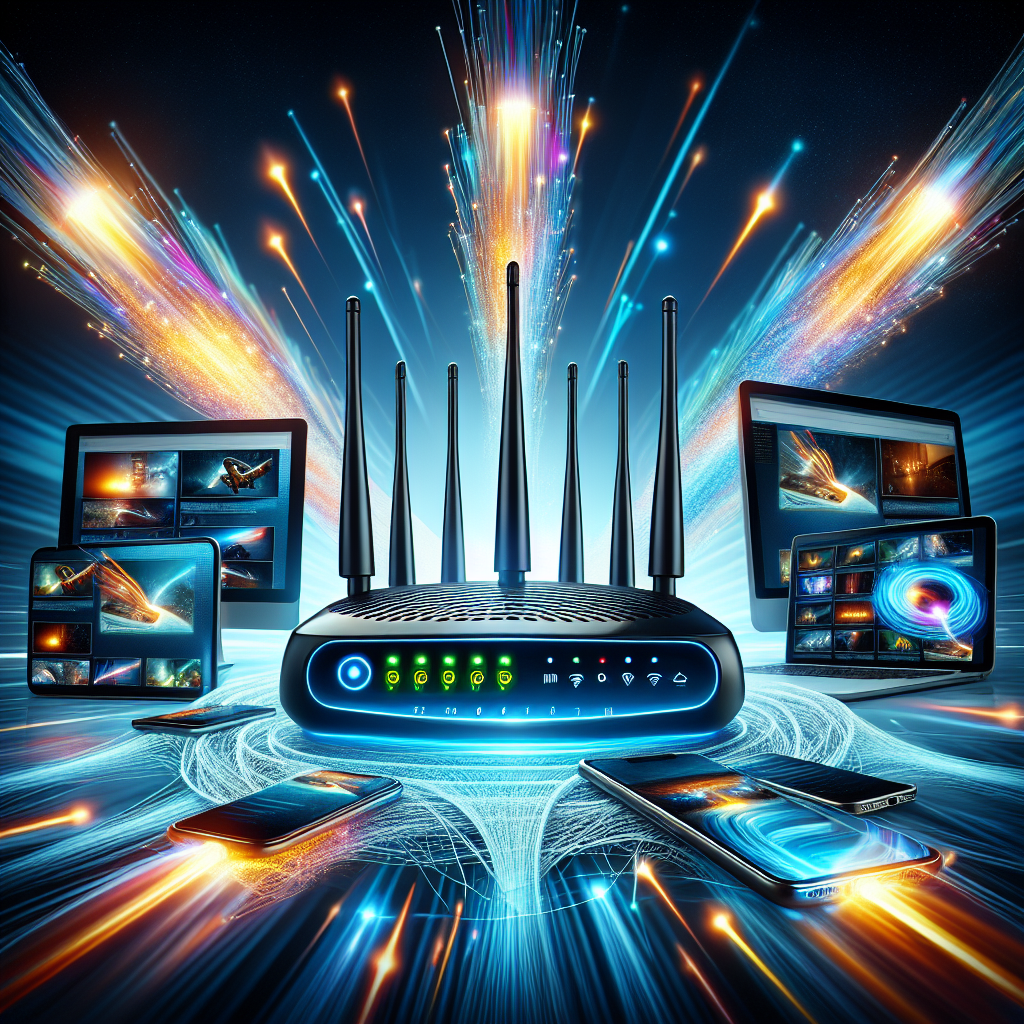In today’s fast-paced digital world, streaming high-quality videos has become a daily necessity for many. The key to a seamless and uninterrupted viewing experience lies in having the fastest internet speeds possible. From 4K resolution to virtual reality content, having a lightning-fast internet connection can make all the difference in enjoying your favorite shows and movies without buffering or lag. In this article, we will explore the importance of having the fastest internet speeds for video streaming, and how it can enhance your entertainment experience. Join us as we delve into the world of high-speed internet and the benefits it can bring to your viewing habits.
Understanding Internet Speeds for Video Streaming

– Definition of internet speed
– Internet speed refers to the rate at which data is transmitted between devices over the internet. It is typically measured in megabits per second (Mbps) and determines how quickly information can be downloaded or uploaded.
– For video streaming, internet speed is crucial as it directly impacts the quality of the streaming experience. Higher internet speeds allow for smoother playback, faster buffering times, and higher resolution streaming without interruptions.
- Importance of high-speed internet for video streaming
- High-speed internet is essential for video streaming to ensure a seamless viewing experience. Insufficient internet speeds can lead to buffering, pixelation, and poor video quality.
- With the increasing popularity of high-definition and 4K video streaming, faster internet speeds are becoming more necessary to support the bandwidth requirements of these formats.
- Additionally, high-speed internet enables multiple devices to simultaneously stream videos without compromising the quality of the streaming experience, making it ideal for households with multiple users.
Factors Affecting Internet Speeds
Understanding Internet Speeds for Video Streaming
-
Bandwidth availability: The amount of data that can be transmitted in a specific amount of time greatly impacts internet speeds for video streaming. Higher bandwidth availability allows for faster data transfer rates, resulting in smoother streaming experiences with minimal buffering.
-
Type of connection (fiber, cable, DSL): The type of internet connection plays a crucial role in determining the speed at which data can be transmitted. Fiber-optic connections are known for their high-speed capabilities, offering faster and more reliable streaming compared to traditional DSL or cable connections. Fiber optics use light signals to transmit data, resulting in quicker speeds and better performance for video streaming.
-
Hardware and software capabilities: The quality of the hardware and software being used also influences internet speeds for video streaming. Outdated routers, modems, or devices may not be able to handle high-speed data transmission effectively, leading to slower streaming speeds and potential interruptions. Ensuring that hardware components are up to date and compatible with the latest streaming technologies can help optimize internet speeds for a seamless viewing experience.

Determining the Optimal Internet Speed for Video Streaming
- Recommended internet speeds for different resolutions (SD, HD, 4K)
In order to enjoy seamless video streaming, the recommended internet speeds vary depending on the resolution of the content being viewed. For standard definition (SD) video streaming, a minimum internet speed of around 3 Mbps is recommended to prevent buffering and ensure smooth playback. Moving on to high definition (HD) streaming, a faster internet connection of at least 5-8 Mbps is advised to support the higher quality video. For those indulging in ultra-high definition 4K streaming, a robust internet speed of 25 Mbps or higher is essential to handle the large amount of data being transmitted for crisp and clear visuals.
- Impact of multiple devices on internet speed
When multiple devices are connected to the same network and engaging in video streaming simultaneously, the internet speed can be significantly impacted. Each additional device consuming bandwidth for streaming purposes can lead to slower speeds for all devices connected to the network. It is crucial to consider the number of devices sharing the internet connection and the type of activities they are engaged in. To maintain fast internet speeds for video streaming, it is advisable to limit the number of devices streaming content concurrently and prioritize the primary device for the best viewing experience.
- Considerations for live streaming and gaming
Live streaming and gaming require higher internet speeds compared to standard video streaming due to the real-time nature of the content. For uninterrupted live streaming of events or gaming sessions, a stable internet connection with speeds ranging from 5-10 Mbps or higher is recommended. Lower latency is crucial for live streaming and gaming to ensure minimal delays and smooth interaction. Additionally, considering the upload speed is equally important for live streaming to ensure that the content is broadcasted smoothly without interruptions or quality degradation. Prioritizing a reliable internet service provider with low latency and high speeds is essential for a seamless live streaming and gaming experience.
Testing Your Current Internet Speed
Determining the Optimal Internet Speed for Video Streaming
- Using online speed test tools
To accurately measure your current internet speed for video streaming, utilize online speed test tools such as Ookla’s Speedtest, Fast.com, or Google’s internet speed test. These tools provide instant results by analyzing your download and upload speeds, as well as ping latency. It is advisable to run multiple tests at different times of the day to ensure consistency and reliability in the data obtained.
- Interpreting speed test results
Once you have conducted the speed test, pay attention to the download speed, which is crucial for streaming high-definition videos. A download speed of at least 25 Mbps is recommended for smooth streaming of 4K content, while 5-10 Mbps is sufficient for standard definition viewing. Additionally, ensure that your upload speed meets the requirements if you plan on live streaming or uploading videos regularly.
- Troubleshooting slow internet speed issues
If the speed test results indicate a slower internet connection than expected, consider troubleshooting common issues that could be impacting your speed. Check for background downloads, close unnecessary browser tabs or applications consuming bandwidth, and ensure your device is connected to the network properly. If the problem persists, contact your internet service provider to address any technical issues or consider upgrading to a higher-speed plan for optimal video streaming performance.
Comparing Different Internet Service Providers (ISPs)
When it comes to choosing an Internet Service Provider (ISP) for high-speed video streaming, it’s essential to consider various factors to ensure optimal viewing experience. Here is a detailed comparison of some of the top ISPs offering fast internet speeds:
Top ISPs Offering High-Speed Internet for Video Streaming
-
AT&T Fiber: Known for its reliable fiber-optic network, AT&T Fiber offers blazing-fast internet speeds ideal for seamless video streaming in high definition. With packages reaching up to 1 Gbps, AT&T Fiber ensures smooth playback without buffering issues.
-
Xfinity by Comcast: Xfinity is another top ISP that provides high-speed internet suitable for video streaming. Offering a range of speed options, Xfinity allows users to choose a plan that best fits their streaming needs, whether it’s casual browsing or 4K streaming.
-
Verizon Fios: Verizon Fios is renowned for its fiber-optic internet service, delivering ultra-fast speeds perfect for uninterrupted video streaming. With symmetrical upload and download speeds, Verizon Fios ensures a reliable connection for streaming content in crystal-clear quality.
Comparing Speeds, Pricing, and Reliability
-
Speed: When comparing ISPs for video streaming, it’s crucial to look at the advertised speeds and consider the actual speeds experienced by users. Conducting speed tests during peak hours can provide insight into an ISP’s consistency in delivering fast internet for streaming.
-
Pricing: While high-speed internet is essential for video streaming, pricing also plays a significant role in choosing an ISP. Consider the cost of the internet plan, any promotional offers, equipment fees, and additional charges to determine the overall affordability of the service.
-
Reliability: In addition to speed and pricing, reliability is key for uninterrupted video streaming. Research customer reviews and ratings to gauge the reliability of an ISP in terms of network stability, customer support, and overall satisfaction.
Understanding the Fine Print: Data Caps and Throttling
-
Data Caps: Some ISPs impose data caps on internet plans, limiting the amount of data that can be used each month. For heavy video streamers, it’s essential to choose an ISP without data caps to avoid overage charges or reduced speeds after reaching the limit.
-
Throttling: ISPs may engage in throttling, a practice where internet speeds are intentionally slowed down for certain activities like video streaming. Be aware of any throttling policies in place and opt for ISPs that offer consistent speeds for streaming without interference.
Upgrading Your Internet Connection for Better Streaming
In the quest for faster internet speeds to enhance video streaming experiences, upgrading your current internet connection is a crucial step. By exploring various options and understanding how to maximize your connection, you can significantly improve your streaming quality. Here are some steps to consider when upgrading your internet for better streaming:
- Steps to upgrade internet speed with your current ISP
- Contact your current ISP to inquire about available higher-speed packages.
- Discuss any promotional offers or discounts that may be applicable to upgrade your plan.
- Consider bundling services such as internet and cable for potential cost savings.
-
Inquire about any equipment upgrades that might be necessary for faster speeds.
-
Exploring fiber-optic internet options
- Research ISPs in your area that offer fiber-optic internet connections.
- Compare the speeds and pricing of fiber-optic plans with your current connection.
- Consider the reliability and consistency of fiber-optic internet for seamless streaming.
-
Check if there are any installation or equipment requirements for switching to fiber-optic internet.
-
Setting up a wired connection for stable streaming
- Invest in high-quality Ethernet cables for a direct wired connection to your router.
- Connect your streaming device or smart TV directly to the router for optimal speed.
- Ensure that the Ethernet cables are not damaged or outdated to maintain a stable connection.
- Test the wired connection to verify improved streaming speeds compared to wireless connections.

By following these steps and considering the various options available, you can effectively upgrade your internet connection for faster speeds and better video streaming quality.
Tips for Optimizing Video Streaming Experience
In order to achieve the fastest internet speeds for video streaming, it is essential to optimize your setup for an uninterrupted viewing experience. Here are some key tips to enhance your video streaming experience:
-
Using Ethernet cables for better connection
Utilizing Ethernet cables instead of relying solely on Wi-Fi can significantly improve the speed and stability of your internet connection. Ethernet cables offer a direct, wired connection to your router, reducing the chances of interference and signal loss that can occur with wireless connections. -
Positioning your router for optimal coverage
Proper placement of your router is crucial for ensuring maximum coverage and signal strength throughout your home. Ideally, place your router in a central location away from obstructions such as walls and electronic devices that can interfere with the signal. Elevating the router to a higher position can also help improve coverage. -
Updating hardware and software for enhanced performance
Regularly updating both your hardware (such as your router and modem) and software (like firmware and streaming apps) is essential for maintaining optimal performance. Updates often include bug fixes, security patches, and performance enhancements that can improve the speed and efficiency of your internet connection for streaming high-quality videos without buffering issues.
Maximizing Speed for Streaming on Various Devices
When it comes to optimizing internet speeds for video streaming on different devices, there are specific strategies to ensure a smooth and uninterrupted viewing experience. Here are some tips tailored to different devices:
Adjusting settings on smart TVs and streaming devices
- Ethernet Connection: Consider using an Ethernet connection instead of Wi-Fi for smart TVs and streaming devices to ensure a more stable and faster internet connection.
- Quality Settings: Adjust the streaming quality settings on your smart TV or streaming device to match your internet speed. Lowering the resolution can help prevent buffering issues.
- Firmware Updates: Regularly update the firmware on your smart TV or streaming device to ensure optimal performance and compatibility with the latest streaming services.
Optimizing streaming quality on smartphones and tablets
- Wi-Fi Signal Strength: Ensure your smartphone or tablet is connected to a strong Wi-Fi signal to maximize internet speeds for streaming.
- App Settings: Check the settings within streaming apps to adjust video quality preferences. Lowering the resolution can improve streaming performance on mobile devices.
- Background Apps: Close unnecessary background apps on your smartphone or tablet to allocate more resources to the streaming app for smoother playback.
Ensuring a smooth streaming experience on gaming consoles
- Wired Connection: Whenever possible, use a wired Ethernet connection for gaming consoles to minimize latency and maximize internet speeds for online gaming and streaming.
- Network Settings: Access the network settings on your gaming console to prioritize streaming data and ensure a consistent connection for uninterrupted gameplay and video streaming.
- Router Placement: Position your router strategically to reduce interference and improve signal strength for gaming consoles, enhancing overall internet speeds for streaming.
By implementing these device-specific tips, users can enhance their internet speeds for video streaming across a variety of devices, optimizing their streaming experience for maximum enjoyment.
FAQs: Fastest Internet Speeds for Video Streaming
What are the fastest internet speeds recommended for video streaming?
The fastest internet speeds recommended for video streaming are typically at least 25 Mbps for streaming in HD quality and at least 50 Mbps for streaming in 4K quality. However, the specific speed requirements may vary depending on the streaming platform and the number of devices connected to the network.
Can I stream video in 4K quality with lower internet speeds?
While technically possible to stream video in 4K quality with lower internet speeds, the experience may not be optimal. Lower internet speeds can result in buffering, poor video quality, and interruptions during playback. It is recommended to have internet speeds of at least 50 Mbps for smooth 4K streaming.
How can I check my internet speed for video streaming?
You can check your internet speed for video streaming by using online speed testing tools such as Speedtest.net or Fast.com. Simply visit the website and click on the “Begin Test” button to measure your current download and upload speeds. It is recommended to perform the test at different times of the day to get an accurate representation of your internet speed.
Is there a difference between internet speeds for streaming on different devices?
Yes, there can be a difference in internet speeds required for streaming on different devices. Some devices may have higher resolution displays or require more bandwidth to stream content smoothly. It is important to consider the capabilities of each device and adjust your internet speed accordingly for an optimal streaming experience.